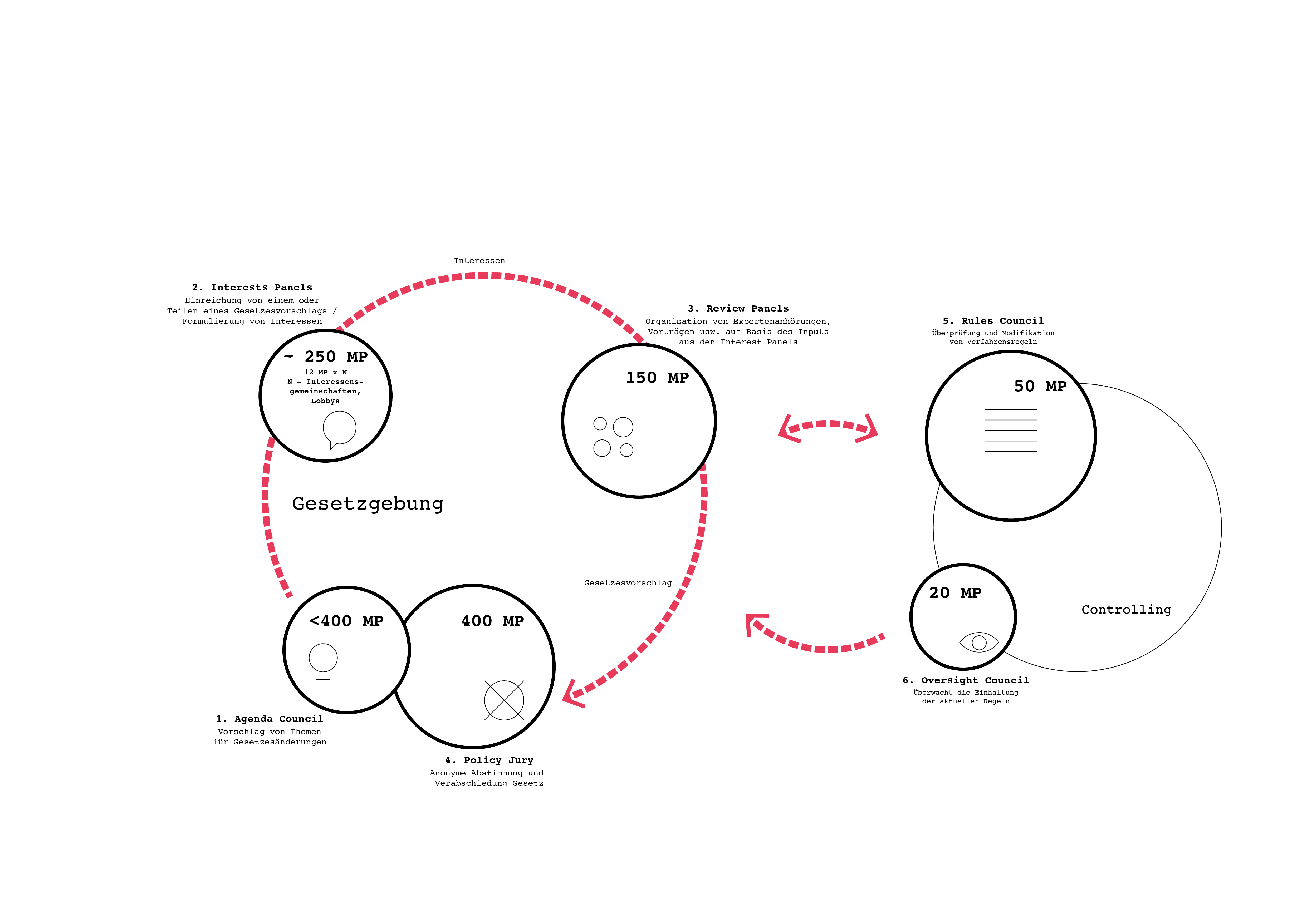1. Agenda Council (agenda and petitions)
A body selected by lot, called the Agenda Council, would have the responsibility of setting the agenda of the political decision-making bodies – but not for the development of legislative proposals, nor for voting on them. The Athenian system did not completely isolate the agenda from the development of proposals, as the Council of the 500 could play a role in both. The assignment of meta-legislative tasks to a body separate from the normal legislative process follows the long-standing principle of “checks and balances” or separation of powers. This body could be selected using a two-tiered lottery system of the willing. Such a two-tier lottery system was also used in Athens, where a group of 6,000 citizens over 30 years of age were elected for a one-year term of office for the courts of the People’s Courts and the legislative bodies.The Agenda Council and its staff would identify problems that require attention, rather than simply reacting to pressure from the media or special interest groups. For example, the United States now faces a little-discussed but undeniable infrastructure deficit (transportation, water systems, etc.) that is likely to be ignored by elected representatives because there is no benefit in addressing the problem. The goal is to determine the agenda rationally and not according to electoral imperatives. But petitions from the population, with a hurdle to be determined, should also be able to influence the agenda. The Agenda Council is to be determined by drawing lots among applicants. 10
2. Interest panels (preparation of legislative proposals)
Once an agenda is set, volunteers are encouraged to organize themselves into interest groups to draft proposals for legislation. To facilitate active participation, these groups should not exceed 12 members. The interest groups would submit legislative proposals, but are not authorized to adopt them. In Athens, selected citizens (ho boulomenos) could propose laws or regulations, but these generally had to go through several self-selected and assigned bodies (the Assembly, the Council of 500 and the People’s Court) before they were finally adopted. The number of interest groups may vary according to the subject matter and should remain unlimited. The Athenian principle of Isegoria (freedom of speech) should be applied here in a derived form. In order to prevent possible influence, the individuals should not be able to speak directly to the decision-making body at the end of the process, in contrast to Athens. The final decision on a law is made by the Policy Jury. Since the aim of the Interest Panel is to make proposals that meet with approval, it is to be assumed that extreme positions are rarely elaborated. The organization of meetings and discussions in the Interest Panels can vary greatly and therefore does not necessarily require a formal framework.11
3. Review Panels (review of legislative proposals)
For each field of expertise there would be a respective Review Panel. The “Council of 500” (Boule) is the closest analogy to Athenian democracy. Unlike the Boulé in Athens, the Review Panels can neither initiate a law nor vote on it in the end. The Review Panels perform most of the functions of a traditional legislative body, except for the initiation and final adoption of laws. The aim is to develop a deeper understanding in a defined area. In traditional legislation, only a small number of members of a parliament normally have the right to deal intensively with an issue. According to the survey, few parliamentarians, those who vote on it at the end, have read and understood a proposed law completely. Voting on laws is often not based on personal expertise, but on party political decisions in the parliamentary groups or vote trading. The concept of Review Panels tries to eliminate this kind of voting decisions. The input from the Interest Panels is reviewed in the Review Panels by organizing hearings, inviting experts or panel discussions. In a further step, the drafting of the legal texts is initiated. Review Panels can also set targets or criteria for final legislative texts and refer draft texts back to the Interest Panel for revision. The selection of members would work in the same way as the Agenda Council – a “lottery of the willing” whereby resorts may not be selected by themselves to avoid possible bias.
The Review Panels would be adequately compensated and provided with meals, childcare and a pleasant working environment. The third body in this system would be full-time, with a staggered term of three years. In this way, new members of the Review Panel can be introduced to a field of expertise 12
4. Policy Jury (Voting on Laws)
Due to the risk of group dynamics or an extremely polarizing proposal, final decisions are made by a separate committee. Each Policy Jury would vote on a law in the same way as the People’s Assembly of Athens.13
For representativeness, it is important that the lottery is held among the entire adult population. Participants will therefore be decently compensated for their participation.
The Policy Jury listens to the various legislative proposals drafted by the Review Panel and an objective presentation of arguments for and against, and then votes on them in a secret ballot. There is no more discussion, there is no party discipline, no peer pressure, no tactical voting behavior, no political haggling and no friendly service. In order to avoid that charismatic speakers influence the vote, the legislative proposals are presented by neutral members of the 6th body of this system, the Oversight Council. Since a good cross-section of the entire society is represented, the decisions of the Policy Jury are validated by law. It cannot be ruled out that critical decisions may be made on the basis of ethnic origin and personal history, especially in the Middle East. A regulatory algorithm in the drawing of lots could prevent a possible accidental overrepresentation. In order to express the meaning and weight of one’s own voice, it is advisable that members, similar to the Athenian Heliatic Oath, promise to vote impartially, in the interest of peaceful coexistence and in accordance with conscience and reason. Short terms of service in combination with compensation payments and some symbolic status fees can achieve an appropriate level of participation and thus a descriptive representativeness. The Policy Jury should have a minimum of 400 members in order to obtain a representative sample.14
In times of multimedia networking via the Internet, an even larger Policy Jury would be conceivable.
However, the importance of the decision speaks for a smaller group. It is important to avoid decisions being taken lightly, e.g. on smartphones. A dignified architectural framework should symbolize the scope of the political decision.
5. Rules Council (determination of the rules of procedure)
A Rules Council, similar in form to the Agenda Council, would establish rules and procedures for all other bodies and councils, such as the lottery procedure itself, quorum requirements, means of obtaining expert opinions, procedures for advice, remuneration and terms, etc.
The members would have limited terms of office. It should be in their natural interest to ensure the fairest and best functioning of all bodies.
It may be appropriate to limit the possibility of participation to those who have previously served on another body.
On the one hand, this provides an additional offer to those who want to continue to engage in politics; on the other hand, it ensures that members have already dealt with the system in detail and a basic understanding of how it works.
With the Rules Council as the 5th body in this system, there is the possibility of changing the legislative process in the future. A self-learning system that can react flexibly to possible political and social changes.15
6. Oversight Council (enforcement of rules)
The last body, determined by lot, deals exclusively with compliance to the rules laid down by the Rules Council. In addition to evaluating the general performance of the staff, they would decide, for example, on complaints or on biased or unfair presentations of the staff. As mentioned above, the Oversight Council‘s responsibilities also include, as neutral government officials, presenting draft legislation from the Review Panel to the Policy Jury. As metalegislative bodies, the Rules Council and the Oversight Council act as authors and guardians of the rules of this system.16 Members of the Oversight Council were to serve a limited term of 3 years, with 1/3 of the officials being replaced each year. As with the Agenda Council, Review Panel and Rules Council, a draw will be held among voluntary applicants.17

